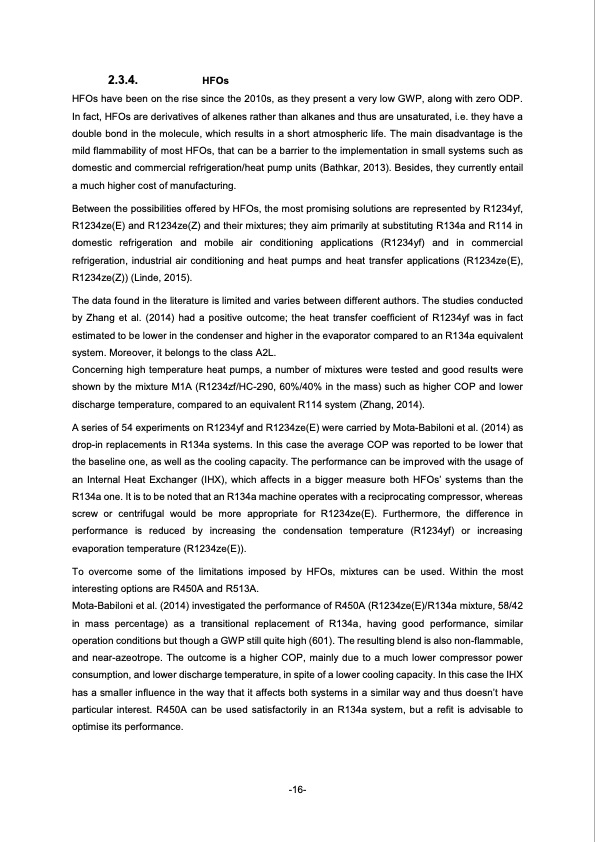
PDF Publication Title:
Text from PDF Page: 025
2.3.4. HFOs HFOs have been on the rise since the 2010s, as they present a very low GWP, along with zero ODP. In fact, HFOs are derivatives of alkenes rather than alkanes and thus are unsaturated, i.e. they have a double bond in the molecule, which results in a short atmospheric life. The main disadvantage is the mild flammability of most HFOs, that can be a barrier to the implementation in small systems such as domestic and commercial refrigeration/heat pump units (Bathkar, 2013). Besides, they currently entail a much higher cost of manufacturing. Between the possibilities offered by HFOs, the most promising solutions are represented by R1234yf, R1234ze(E) and R1234ze(Z) and their mixtures; they aim primarily at substituting R134a and R114 in domestic refrigeration and mobile air conditioning applications (R1234yf) and in commercial refrigeration, industrial air conditioning and heat pumps and heat transfer applications (R1234ze(E), R1234ze(Z)) (Linde, 2015). The data found in the literature is limited and varies between different authors. The studies conducted by Zhang et al. (2014) had a positive outcome; the heat transfer coefficient of R1234yf was in fact estimated to be lower in the condenser and higher in the evaporator compared to an R134a equivalent system. Moreover, it belongs to the class A2L. Concerning high temperature heat pumps, a number of mixtures were tested and good results were shown by the mixture M1A (R1234zf/HC-290, 60%/40% in the mass) such as higher COP and lower discharge temperature, compared to an equivalent R114 system (Zhang, 2014). A series of 54 experiments on R1234yf and R1234ze(E) were carried by Mota-Babiloni et al. (2014) as drop-in replacements in R134a systems. In this case the average COP was reported to be lower that the baseline one, as well as the cooling capacity. The performance can be improved with the usage of an Internal Heat Exchanger (IHX), which affects in a bigger measure both HFOs’ systems than the R134a one. It is to be noted that an R134a machine operates with a reciprocating compressor, whereas screw or centrifugal would be more appropriate for R1234ze(E). Furthermore, the difference in performance is reduced by increasing the condensation temperature (R1234yf) or increasing evaporation temperature (R1234ze(E)). To overcome some of the limitations imposed by HFOs, mixtures can be used. Within the most interesting options are R450A and R513A. Mota-Babiloni et al. (2014) investigated the performance of R450A (R1234ze(E)/R134a mixture, 58/42 in mass percentage) as a transitional replacement of R134a, having good performance, similar operation conditions but though a GWP still quite high (601). The resulting blend is also non-flammable, and near-azeotrope. The outcome is a higher COP, mainly due to a much lower compressor power consumption, and lower discharge temperature, in spite of a lower cooling capacity. In this case the IHX has a smaller influence in the way that it affects both systems in a similar way and thus doesn’t have particular interest. R450A can be used satisfactorily in an R134a system, but a refit is advisable to optimise its performance. -16-PDF Image | Next generation of refrigerants for residential heat pump systems

PDF Search Title:
Next generation of refrigerants for residential heat pump systemsOriginal File Name Searched:
MartinaLonghini_ThesisReport.pdfDIY PDF Search: Google It | Yahoo | Bing
CO2 Organic Rankine Cycle Experimenter Platform The supercritical CO2 phase change system is both a heat pump and organic rankine cycle which can be used for those purposes and as a supercritical extractor for advanced subcritical and supercritical extraction technology. Uses include producing nanoparticles, precious metal CO2 extraction, lithium battery recycling, and other applications... More Info
Heat Pumps CO2 ORC Heat Pump System Platform More Info
| CONTACT TEL: 608-238-6001 Email: greg@infinityturbine.com | RSS | AMP |